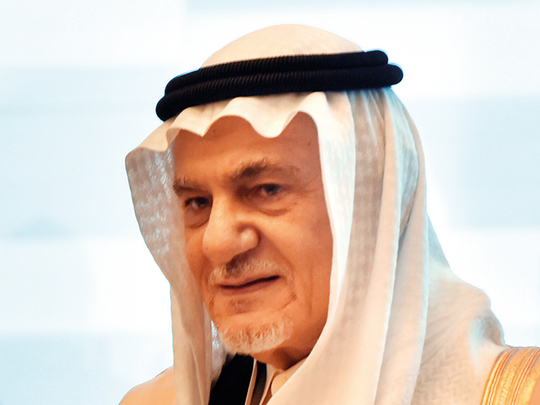
Abu Dhabi: As the world order and political trends continues to change, so does it bring with it a host of challenges and uncertainty for the region according to diplomats and experts who spoke at a conference in Abu Dhabi on Tuesday.
Organised by the Emirates Centre for Strategic Studies and Research (ECSSR), its annual conference focused on several issues that currently face the region, such as terrorism, oil prices, regional conflicts, and what a new US president will mean for the area.
“There are major transformations happening worldwide, these transformations will have a strategic challenge for all the countries around the world. Uncertainty prevails with a number of questions with no ready answers,” said Prince Turki Al Faisal Bin Abdul Aziz, Chairman of the King Faisal Centre for Research and Islamic Studies, and former director of intelligence in Saudi Arabia.
“What we see in a [possible] change of the American vision for the region, and the Russian boldness in terms of their military intervention [in Syria] are indications of the forthcoming challenges and changes,” he added.
Speaking on Iran, Prince Turki said the GCC was not looking for a conflict, but noted that international principles must be respected and abided by, and should form the basis of any friendly relations.
“We do not want to have problems with Iran, the Iranian people are our neighbours [and] Muslims [like us]. The Gulf countries initiated a peace message to Iran through Kuwait which called for an agreement on specific principals that our relationship must be based on, and these are international principles that already exist.”
Commenting on Yemen, Prince Turki said the GCC remained fully committed to the country and its people, and would look to have Yemen accepted as a GCC member state in the future.
On the subject of terrorism, Prince Turki said, “Terrorism is a disease that we should cure [and defeat] so as to uphold our tolerant religion. We must also hold our Islamic discourse which will help cure this disease.”
Giving an American perspective on what a Trump presidency means for the region, Professor Mark Tessler, department of political science, University of Michigan, said that President Trump would most likely forge positive relations with the GCC, but also warned about Trump’s unpredictable behaviour.
“People here [in the Middle East] are doing what Americans are doing, trying to figure out what to expect [from President Trump], and picking up on different messages that he is sending and coming to different conclusions.
“Trump says something different everyday, he sometimes makes things up… It’s not going to be a clear answer, he says different things at different times,” he added.
Tessler also said that some of President Trump’s previous comments towards Muslims and Islam was worrisome and could be problematic in the long term. “There are questions about the character of our new president, what he stands for, [and what] his values are. There is sadly a strong current of Islamophobia in the US… It has been activated as one of the number of elements by our new president… He came out [during the election campaign] and said that ‘I Donald J. Trump calls for the complete shut down of Muslims entering the US’, this was the Muslim ban as it was called.
“One question that comes up immediately is [if] he is talking about Islam, or is he talking about radical extremism. So we have a lot of different contradictory statements,” he added.












